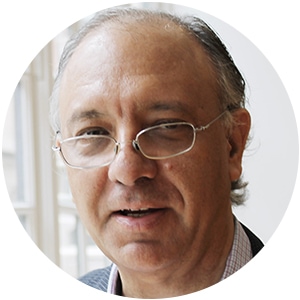Jorge Mariscal puts more than 20 years of experience in emerging markets to work for UBS Wealth Management as its emerging markets chief investment officer. Mariscal visited Global Finance in June to discuss the global markets.

Global Finance: What are your overall views of markets?
Jorge Mariscal: We are positive risk [“risk-on”] still, despite all the noise on the US and European political fronts. It has really paid to be invested over the last two and a half to three years, because fundamentals have been supportive of financial markets in general. Yes, there are geopolitical issues, but there always are. If you look at the chart of global equities over the past two years, there are little blips around the political events; but it really has continued to have a positive slope almost uninterruptedly.
GF: What’s your opinion on China? What are the issues?
Mariscal: Between now and when the Chinese politburo meets later this year [for the 19th National Congress] to decide on policy, the priority will be maintaining economic stability. Next year might be a bit slower, but the offset could be that the Chinese are going to pick up the reform momentum that’s been pushed to the side to prioritize short-term economic priorities.
What worries us, though, is that while China will manage the cycle well, it’s bound to have a recession at some point if it’s going to become a modern economy integrated into the global economy. The world has to be ready for that, but I don’t think we are.
GF: Where do you see the hot spots in emerging markets for investors?
Mariscal: China, Indonesia, Thailand and Brazil, which is a more controversial call.
GF: Why do you like Brazil, with all the political risk?
Mariscal: The political risk has created a valuation opportunity. Since this new scandal involving President Temer surfaced a few weeks ago, the market’s down almost 17% in dollar terms and the Brazilian real is down about 7% versus the US dollar. Despite the political noise, the economy has been improving. It’s coming out of a recession, and we expect earnings growth in Brazil to be close to 20% versus 2016.
Don’t pay so much attention to the political noise. Look at the fundamentals and what’s happening at the macro level: valuations, central bank actions and whether policies are supportive. Politics are, of course, important, but overrated.
GF: What impact will the Qatari isolation have on markets if it continues to fester?
Mariscal: It could have an impact on oil supplies, which would not necessarily be all that bad. The world has recently been suffering more from weak oil prices than from higher oil prices. Qatari bonds have been hurt, of course, and there are some opportunities there.
GF: The US government has just passed a new Russian sanctions bill. What are your thoughts on Russia?
Mariscal: In some ways, the sanctions have been beneficial to Russia. Certain sectors are thriving, like the agricultural sector, for example. They essentially have been protected by the sanctions, and Putin has been very keen on taking advantage of these to protect certain sectors—Russia is exporting a lot more wheat, corn and oats than ever. The sanctions have been mostly on people rather than on sectors, and on some access to the capital markets; but Russia is a net creditor with a lot of reserves and assets.
There are geopolitical risks; but the economy is coming out of a recession, and the central bank is doing a great job taming inflation and bringing interest rates down. Russia is dependent on oil; but provided oil prices remain stable between $45 and $60 a barrel, Russia will continue to recover.
There’s also a fair amount of political stability. Putin is very popular and will probably win the election. Regardless of whether he runs, he’s probably going to remain as some kind of consultant of the next government. We’re rooting for the rule of law and reduced corruption.



